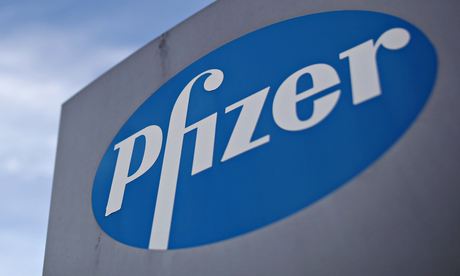
Pfizer has confirmed details of a multi-billion pound takeover approach for UK company AstraZeneca. Photograph: Dan Kitwood/PA
Pfizer has set the stage for a battle to buy Britain's AstraZeneca after the US drugs group said it was willing to pay almost £60bn to secure the biggest foreign takeover of a UK company.
The world's biggest drug company went public with its interest in AstraZeneca after the UK company rejected a second bid approach at the weekend. Its hostile move piles pressure on AstraZeneca's board to enter talks on a deal that threatens big job cuts.
The news of Pfizer's interest sent AstraZeneca's shares soaring by 15%, to £46.91, adding almost £8bn to the company's market value. While trade unions warned on the consequences for AstraZeneca's 7,200 UK employees and a product line that accounts for 2.3% of UK goods exports, Downing Street said it had no objection to a deal and a top ten shareholder in AstraZeneca described Pfizer's interest as a "credible approach."
David Cameron's official spokesman said the government was not against takeovers of British companies by foreign firms.
"The fact that Britain has an open trade-based economy which is open both to investment but also British firms investing overseas, that is a strength to the UK. In terms of measures that the UK government takes to attract investment to the UK, in R&D [research and development] and the like, what we have done in the pharmaceutical sector... we have a range of policies that make us a very attractive place to do business."
In a statement to the stock exchange, Pfizer said it had approached AstraZeneca in January and again on Saturday.
In January Pfizer, which produces Viagra, indicated it was willing to pay £46.61 a share for AstraZeneca in cash and shares, valuing AstraZeneca at £58.8bn. The companies discussed a potential deal but AstraZeneca broke off talks on 12 January.
The US company contacted AstraZeneca on Saturday but AstraZeneca refused to hold talks without a specific proposal for an attractive offer.
A fund manager at one of AstraZeneca's top 10 investors said he was unhappy that details of January's approach were forced out by Pfizer's statement and that AstraZeneca should talk to Pfizer.
"I think what Pfizer is attempting to do is to put pressure on AstraZeneca's board to engage. I would have thought the board would be under increased pressure to think seriously about the correct valuation of this business.
"This is important news and it is potentially unwise for boards not to disclose this sort of information. This is a credible approach from another of the world's biggest companies."
AstraZeneca said Pfizer's overture undervalued the company and only offered shareholders 30% of the price in cash. It also raised concerns about risks involved in Pfizer's proposal to move its headquarters to the UK for tax purposes.
Under Pfizer's plan, the combined company would be incorporated in the UK with shares listed in New York and management in Britain and the US. The arrangement would mean Pfizer would not pay US tax on its non-US earnings.
Ian Read, Pfizer's Scottish-born chief executive, said the tax structure would protect AstraZeneca's revenues from the 38% rate of corporation tax in the US. UK corporation tax is 21% and will fall to 20% next year.
A deal would raise concerns about job losses among AstraZeneca's 7,200 employees in the UK and 50,000-strong workforce worldwide.
Pfizer recently closed its main UK research and development centre at Sandwich in Kent with the loss of 2,400 jobs. The closure was a blow to the local economy and the government's ambition to increase high-skill jobs.
Read said the proposed deal would let Pfizer eliminate "redundant functions" and overlapping operations and refused to pledge that manufacturing would stay in the UK.
"I can't make any firm commitments. We see the UK as an attractive place to do science and manufacturing. Jobs and investment tend to follow incentives.
"You need to look at this restructuring in the context of an industry responding to society's request for increases in efficiency and productivity."
A takeover of AstraZeneca, which is one of the biggest employers in Chancellor George Osborne's Tatton constituency, would be by far the largest foreign acquisition of a UK company, dwarfing Kraft's £12bn buy-up of Cadbury in 2010 and Telefonica of Spain's £17bn takeover of O2 in 2005.
Allan Black, the GMB union's national officer for the chemicals industry, said: "What we face here is a hostile approach by this US company to eventually migrate these well paid UK-based manufacturing and research and development jobs to the Far East."
Pfizer said it was was considering an offer at a "significant premium" to AstraZeneca's share price. Under takeover rules it has until 26 May to make a firm offer unless an extension is granted.
Pfizer said an offer for AstraZeneca would give the UK group's shareholders a payout worth much more than the "undisturbed" share price on 17 April, before bid speculation started. The shares closed that day at £37.83 but after Pfizer's announcement jumped to £47.07 – above Pfizer's earlier mooted offer and valuing AstraZeneca at £59.5bn.
Speculation about a possible bid from Pfizer has sent AstraZeneca's shares up since Easter. The UK company's chief executive, Pascal Soriot, said last week a takeover at a standard premium would undervalue the company and the progress it was making in developing new products, for example cancer drugs.
Pfizer is said to be keen to put to use some of its £40bn cash pile obtained from its foreign subsidiaries, which would trigger big tax bills if it was repatriated to the US to be paid in dividends.
No comments:
Post a Comment
thank you for your precious time and feedback.